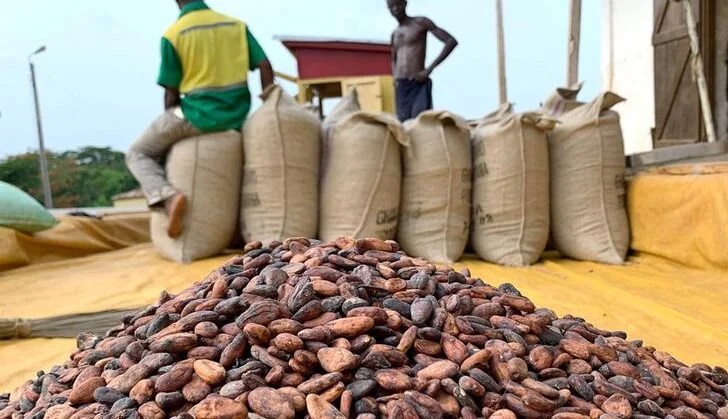The Minority Caucus in Parliament has strongly criticized the government and the Ghana Cocoa Board (COCOBOD) over what they describe as a deliberate refusal to increase the producer price of cocoa, despite favourable market conditions.
At a press conference on Monday, members of the Minority expressed outrage at what they called a betrayal of cocoa farmers across the country.
The issue gained momentum after COCOBOD released two conflicting statements within 24 hours, sparking widespread confusion and concern.
On April 8, 2025, COCOBOD issued a letter signed by Dr. James Kofi Kutsoati, Acting Deputy Chief Executive (Operations), addressed to the Licensed Cocoa Buyers’ Association of Ghana (LICOBAG), citing operational and financial challenges as reasons for not adjusting the producer price for the 2025/26 season.
However, on April 9, 2025, COCOBOD’s Public Affairs Department issued another release titled “The Public Should Disregard Any Statement Suggesting a Producer Price Announcement”, in which it provided entirely different reasons — notably, the absence of a Producer Price Review Committee — for not reviewing the cocoa price.
“This posture of Government raises a number of questions,” the Minority stated.
“Is Government and COCOBOD telling cocoa farmers and Ghanaians that between now and September 30, when the 2024/25 crop season ends, there will be no price adjustment irrespective of changes in the international market?”
The Minority also accused the government of reneging on its campaign promise.
They referenced the National Democratic Congress (NDC)’s manifesto, which pledged regular price increases based on world market trends and a guaranteed 70% of the Free on Board (FOB) price to farmers.
“Were the promises by Hon. Eric Opoku, Hon. Dr. Cassiel Ato Forson, and others to pay cocoa farmers GHC6,000 per bag mere propaganda just to win votes?” they asked.
“Cocoa farmers believed in the NDC’s promises and voted overwhelmingly. The government must stop the excuses and honour its commitment.”
On COCOBOD’s claims of financial constraints, the Minority rebutted that the Board has both the financial and economic capacity to adjust prices.
“It is important to point out that COCOBOD has the economic size and capacity to pay whatever debt it owes,” they argued, pointing to the over 70,000 hectares of cocoa farms rehabilitated through the AfDB loan, which are now yielding crops.
Further, the Minority revealed that as of February 2025, cocoa purchases had exceeded 560,000 tonnes — a figure estimated to generate close to $3 billion based on average FOB prices.
“Anybody talking about COCOBOD’s debt without situating it within its financial capability to pay is making a sad mistake,” they said.
The Minority emphasized the success of the previous New Patriotic Party (NPP) administration’s new financing model, which allowed COCOBOD to operate the 2024/25 cocoa season without resorting to its annual syndicated loan.
“For the first time in 32 years, COCOBOD did not go for the annual loan.
Over US$2 billion has already come through the Bank of Ghana between October 2024 and January 2025,” they added.
They criticized the justification regarding the absence of a Producer Price Review Committee.
“This is a standing committee, not subject to the whims of COCOBOD’s Board of Directors,” they asserted.
A key concern raised was the widening price disparity between Ghana and neighbouring Côte d’Ivoire.
According to the Minority, the recent 22.24% increase in cocoa prices in Côte d’Ivoire — from 1,800 CFA to 2,200 CFA per kilo — has significantly undermined Ghana’s competitiveness.
“At the current exchange rate, Ivorian farmers are receiving the equivalent of GHC3,635 per 64kg bag — a GHC535 difference per bag compared to Ghanaian farmers,” they stated.
“This will incentivize smuggling and could cause a mass exodus of cocoa beans from regions like Western South, Western North, and Brong Ahafo.”
The group also warned of the rising trend of cocoa farmers selling their farms for illegal mining due to uncompetitive prices and high gold values.
“This is a national security threat,” they warned.
“Previous administrations had the foresight to swiftly adjust cocoa prices when disparities emerged. This government’s failure to act is baffling and deeply concerning,” they added.
Calling for immediate action, the Minority concluded: “The government must stop the excuses and pay cocoa farmers a minimum of GHC6,000 per bag. This is not just an economic decision — it is about protecting livelihoods and the future of Ghana’s cocoa industry.”









